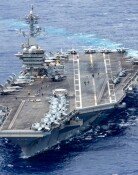US-UK strikes target Iran-backed Houthis in Yemen
US-UK strikes target Iran-backed Houthis in Yemen
Posted January. 13, 2024 08:05,
Updated January. 13, 2024 08:05

On Friday, the U.S. and U.K. military conducted surprise strikes against Iran-backed Houthis in Yemen, responding to their attacks on the Red Sea, a vital global logistics and supply route. These strikes mark the first joint military action by U.S. and U.K. forces in the Middle East since the October 7 attack on the Gaza Strip last year. This event has raised concerns about the potential escalation of the conflict into a full-scale war between the U.S. and Iran.
U.S. President Joe Biden announced that U.S. military forces, in collaboration with the United Kingdom and support from Australia, Bahrain, Canada, and the Netherlands, carried out successful strikes against multiple Houthi targets in Yemen. British Prime Minister Rishi Sunak also stated the actions as "necessary and proportionate self-defense measures."
The U.S. Central Command reported that joint forces targeted 16 Houthi militant locations with strikes on over 60 targets, utilizing submarines and fighter jets, among other resources. The Command declared that this multinational effort reinforces the international commitment to freedom of navigation and addresses the repeated Houthi attacks on commercial vessels in the Red Sea.
Ten governments, including the Republic of Korea, released statements expressing support for the U.S.-U.K. joint strikes. Countries such as Australia, Bahrain, Canada, Denmark, Germany, Netherlands, and New Zealand supported the U.S. and the U.K., emphasizing that the strikes were carried out "in accordance with the inherent right of individual and collective self-defense, consistent with the UN Charter." They clarified that these measures aimed to protect their vessels from Houthi rebel attacks.
Following the strikes, the Houthis issued a statement via AFP, warning that the attackers would face consequences and vowing to continue targeting vessels associated with Israel. Iran criticized the joint strike, denouncing it as a clear violation of Yemen's sovereignty and international law. Russia, a supporter of Hamas, called for an emergency U.N. Security Council meeting immediately after the strikes.
Korean industries face potential impact, particularly those reliant on Red Sea shipping routes to reach the European market. TV and home appliance companies involved in transporting parts from China and Southeast Asia for assembly in Europe may be affected, along with automobile, materials, and petrochemical firms exporting finished products to Europe. The Suez Canal, connecting the Red Sea and Europe, facilitates about 10% of marine transport for Korea's domestic home appliances companies.
International oil prices are experiencing instability, with the WTI price for February delivery at the New York Mercantile Exchange rising 2.7% on January 12 to 73.96 U.S. dollars per barrel. Korean government officials are closely monitoring the trend of oil prices, recognizing their sensitivity to conflicts in the Middle East region.
Eun-A Cho achim@donga.com







